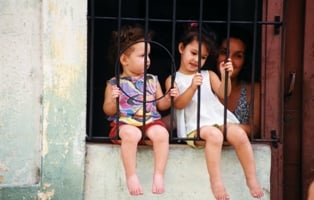 Editor's note: As we await with joyful anticipation the Pope's visit to Cuba, I am pleased to share the following guest contribution from Robin Fieser of Catholic Relief Services. Please join me in praying for our Holy Father Pope Benedict XVI and for all of those who will be touched and inspired by his visit. LMH
Editor's note: As we await with joyful anticipation the Pope's visit to Cuba, I am pleased to share the following guest contribution from Robin Fieser of Catholic Relief Services. Please join me in praying for our Holy Father Pope Benedict XVI and for all of those who will be touched and inspired by his visit. LMH
The Pope arrives in Havana on Tuesday and the old city’s cobblestone streets are teeming with camera-toting tourists eagerly awaiting his arrival. Hotel lobbies are bustling, restaurants are hopping, and a fleet of 1950s American cars cruises up and down Havana’s main streets shuttling tourists from one sight to the next.
Far from the tourist center is A La Mar, an urban enclave created in the early 1960s for supporters of the revolution. A La Mar was originally designed as a new city for the “new man” of the revolution, based on communist and atheist ideas. Today, it is a “bedroom community” with no jobs, no services, bad transportation and widespread poverty, said Father Isidro Hoyos.
Our friends from Caritas Cubana took me there this weekend to show me a program for people with Down syndrome. Each Saturday for three hours, 18 children with Down syndrome and their families — mothers, fathers, sisters, and brothers — meet at Father Hoyos’ parish house in A La Mar to share their experiences and learn from one another.
“This is a place for us to realize our dream and get over our hurt,” said Clara Elena Cartaya, whose son, Dimell, 23, has Down syndrome. “Caritas gives us a hand and shows us the road.”
Caritas brings in teachers and psychologists to teach the children basic reading and writing. Most can now sign their names.
They do exercises together and art projects. They take day trips to the national aquarium to learn about wildlife. Soon, they are going to start riding horses as kind of therapy. And they learn how to do simple but necessary things for themselves, like butter bread and take a bath.
The activities teach the kids how to socialize and be more independent, the Caritas psychologist told me. That of course builds their self-esteem and makes them happier people.
Those lessons are equally important for the parents, who often do not know they unintentionally stifle their children’s growth by babying them.
One father told me he did everything for his 18-year-old son, including bathing him, before he started the program.
“We are all, most of us, overprotective parents. We have to learn how to allow them to be independent,” said Cartaya, who works as a volunteer coordinating the program. Cartaya left her job just after her son was born to care for him. The Cuban government paid her a monthly salary to do so.
In Cuba, people with Down syndrome do not hold jobs. It was only a few years ago, at the behest of Caritas, that the government even began issuing them identification cards.
Meanwhile, parents of children with Down syndrome have very little access to information and receive no specialized attention. For example, many of the parents I spoke to came home from the hospital with their newborns knowing nothing about Down syndrome. Some had access to the internet to research the subject, but most did not. And while all of the parents I spoke to said their children attended special schools, the education did not involve the parents in any way.
After graduation, parents have the option to institutionalize their children. If they don’t, they are basically on their own. With an average salary of about $10 per month, most families cannot even afford to buy the paper needed for the art projects the children do with Caritas.
“Caritas is the only place where our kids can get personalized attention and systematic learning,” said Cartaya. “We know that kids with Down give a lot of love and they need a lot of love in return.”
Robyn Fieser is CRS’ regional information officer for Latin America and the Caribbean. She is based in the Dominican Republic.
About the Author

Guest
We welcome guest contributors who graciously volunteer their writing for our readers. Please support our guest writers by visiting their sites, purchasing their work, and leaving comments to thank them for sharing their gifts here on CatholicMom.com. To inquire about serving as a guest contributor, contact editor@CatholicMom.com.


.png?width=1806&height=731&name=CatholicMom_hcfm_logo1_pos_871c_2728c%20(002).png)
Comments